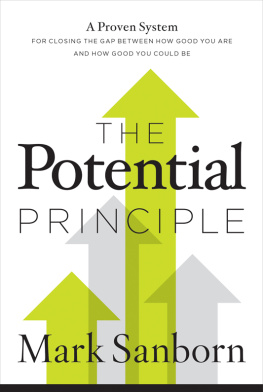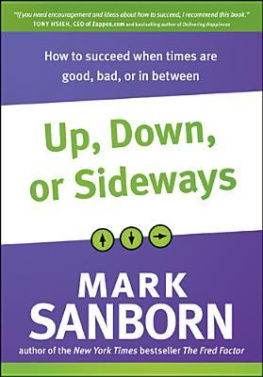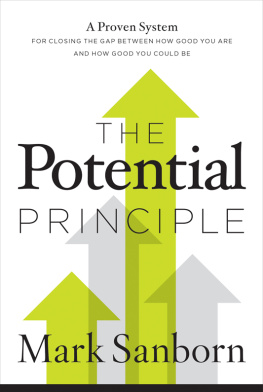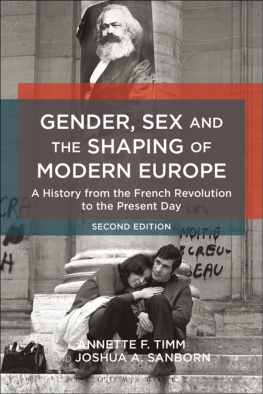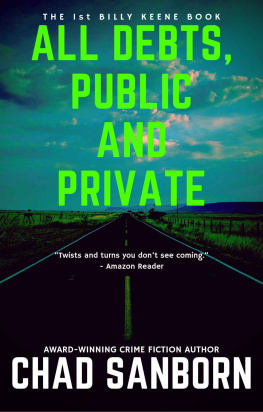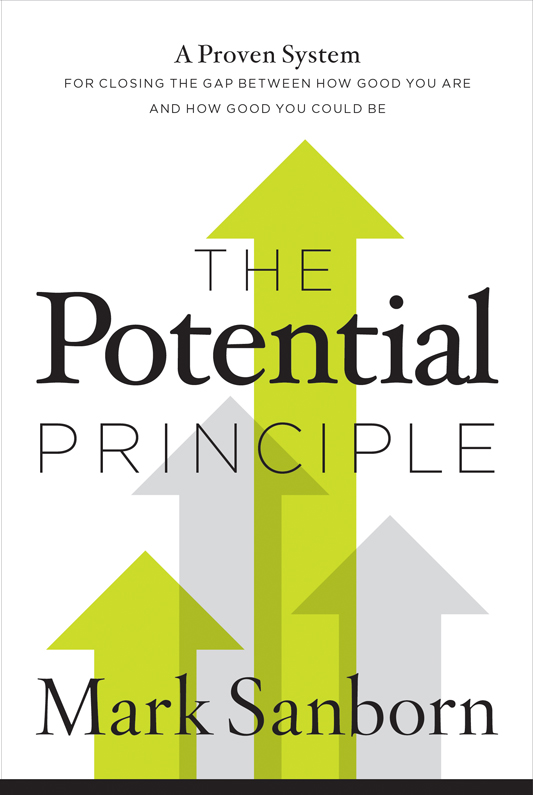Contents
Table of Contents
Guide
Praise for The Potential Principle
Potential was always a negative term. It meant what you could be but arent. Mark has created a blueprint to turn your potential into reality. Everyone who thinks they have more in them should read this book.
Scott Stratten, president of UnMarketing Inc., bestselling author
The Potential Principle not only reminds you that you can always get better, it gives you the precise blueprint for doing just that. A must-read for high achievers!
Jay Baer, president of Convince & Convert and author of Hug Your Haters
Our company founder had a belief that we should re-earn our positions every day in every way. Mark has revealed the treasure map to get thereI am reenergized.
Dina Dwyer-Owens, cochairman of the Dwyer Group and author of Values, Inc.
If youve ever wondered, Can I do better? this book is for you. If youve ever dreamed of going beyond your best, dont miss Mark Sanborns The Potential Principle.
Jeff Goins, bestselling author of The Art of Work and Real Artists Dont Starve
Mark Sanborns sage advice to disrupt yourself is spot on. The Potential Principle will turbocharge your next level of success. The future belongs to those who keep getting better.
Robert B. Tucker, author of Innovation Is Everybodys Business
The Potential Principle is absolutely amazing. After being successful in several areas of my life I got a wake-up call from Mark Sanborn. Reading this and realizing how good I can be shifted me into another gear. Master the Potential Matrix and witness The You youve always wanted to be.
Rod Smith, two-times Super Bowl NFL Champion, author of The Rod Effect
In his latest book, The Potential Principle, Mark inspires others to unlock their true potential. He emphasizes that the only limitation we have is the limitation we place upon ourselves. This book provides a framework and insights as to how to be the best version of you! Thank you, Mark, for always encouraging continuous improvement. You inspire us to embrace the journey!
Zoe Kane, senior director, Sun Pharmaceutical Industries, Inc.

2017 Mark Sanborn
All rights reserved. No portion of this book may be reproduced, stored in a retrieval system, or transmitted in any form or by any meanselectronic, mechanical, photocopy, recording, scanning, or otherexcept for brief quotations in critical reviews or articles, without the prior written permission of the publisher.
Published in Nashville, Tennessee, by Nelson Books, an imprint of Thomas Nelson. Nelson Books and Thomas Nelson are registered trademarks of HarperCollins Christian Publishing, Inc.
Published in association with Yates & Yates, www.yates2.com.
Thomas Nelson titles may be purchased in bulk for educational, business, fund-raising, or sales promotional use. For information, please e-mail SpecialMarkets@ThomasNelson.com.
Scripture quotations are taken from the Holy Bible, King James Version (public domain).
Any Internet addresses, phone numbers, or company or product information printed in this book are offered as a resource and are not intended in any way to be or to imply an endorsement by Thomas Nelson, nor does Thomas Nelson vouch for the existence, content, or services of these sites, phone numbers, companies, or products beyond the life of this book.
Library of Congress Cataloging-in-Publication Data
Names: Sanborn, Mark, author.
Title: The potential principle: a proven system for closing the gap between how good you are and how good you could be / Mark Sanborn.
Description: Nashville: Thomas Nelson, 2017.
Epub Edition July 2017 ISBN 9780718093167
Identifiers: LCCN 2016044059| ISBN 9780718093143 (hardback) | ISBN 9780718093167 (eBook)
Subjects: LCSH: Self-actualization (Psychology)
Classification: LCC BF637.S4 S253 2017 | DDC 650.1--dc23 LC record available at https://lccn.loc.gov/2016044059
Printed in the United States of America
17 18 19 20 21 LSC 10 9 8 7 6 5 4 3 2 1
To everyone who is committed to continually getting better and making the world around them better too.
Information about External Hyperlinks in this ebook
Please note that footnotes in this ebook may contain hyperlinks to external websites as part of bibliographic citations. These hyperlinks have not been activated by the publisher, who cannot verify the accuracy of these links beyond the date of publication.
Wealth, notoriety, place and power are no measure of success whatever. The only true measure of success is the ratio between what we might have done and what we might have been on the one hand, and the thing we have made of ourselves on the other.
H. G. WELLS
In 1985 three-time Olympic athlete John Howard was at the Bonneville Salt Flats, trying to set a new land speed record... on a bicycle. Howard was not riding your dads Schwinn. His was a specially built bicycle. One turn of the pedals moved the bike more than 110 feet. When Howard set the land speed record, his monitored heart rate was 195 beats per minute. His top speed? 152 miles per hour.
If you guessed that this is the top speed for riding a bicycle, youd be wrong. A decade later, a European beat Howards best by reaching a top speed of 161 miles per hour.
You might have little or no interest in bicycles or land speed records. Thats not the point. Whats important is this: We have no idea what is possible physically, mentally, or organizationally. Most of us far underestimate our own potential and the potential of others.
BEYOND EXPERIENCE
Even though Im no mind reader, I can say with a high degree of confidence that you were at least surprised, if not shocked, that a human could ride a bicycle so fast. Nothing in the average persons experience with bicycles would suggest that anyone could ride one as fast as 150 miles per hour. Weve never ridden a bicycle faster than 40, maybe 50 miles per hour. Whats more, most of us have never been in a car thats gone faster than 110 or 120. Based on our experiencethat is, what we knowmost of us would guess the top speed for a bicycle is far slower than whats actually possible.
This means that sometimes our experienceour frame of referenceworks against us. In this case our experience didnt lead to a complete failurewe didnt say 500 miles per hour. But we set a limit based on what we thought was possible, only to find out that we didnt have a clue. Of course, most of us arent terribly bothered that we underestimated the land speed record of bicycles.
But what about when the subject is you and your potential? The hard truth is that we use the same deductive powers on ourselves that we used to determine the speed of the fastest bike ride. In fact, its actually worse. My question about the top speed of a bicycle was meant to put your imagination to the test. But what if I had asked, How fast could you ride a bicycle?
Now your experience is working against you even more. Once again, I cant possibly know how fast you think you can ride a bicycle. But I can tell you one thing: Your answer is probably wrong. You can ride a bike much faster than you think.
Your imagination is limited because of your experience. Maybe thats why Einstein is purported to have said imagination is more important than knowledge, for knowledge is limited to all we know and understand.

